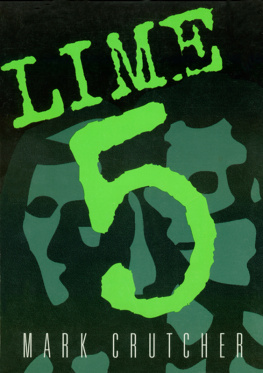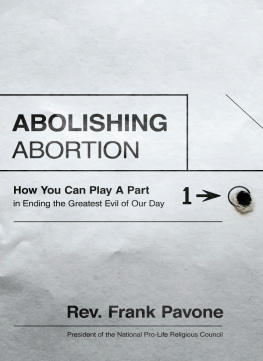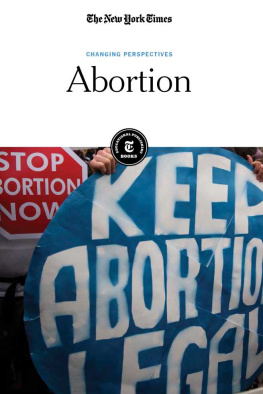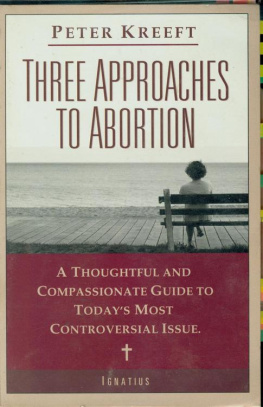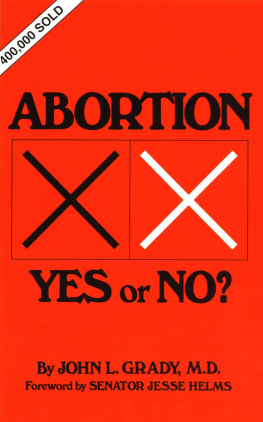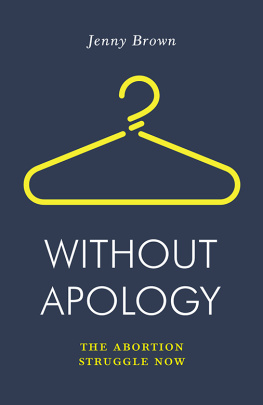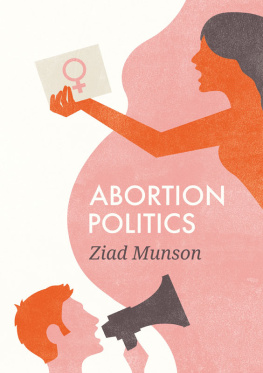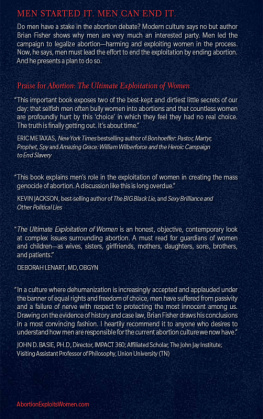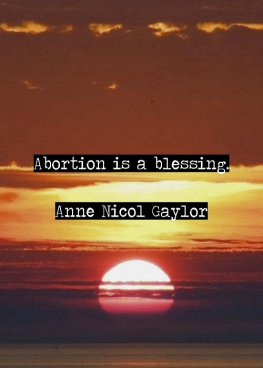
Copyright 2013 Janet Morana
All rights reserved. With the exception of short excerpts used in articles and critical review, no part of this work may be reproduced, transmitted, or stored in any form whatsoever, printed or electronic, without the prior written permission of the publisher.
Cover design by Caroline Kiser.
Cataloging-in-Publication data on file with the Library of Congress
ISBN: 978-1-61890-127-9
Published in the United States by
Saint Benedict Press, LLC
PO Box 410487
Charlotte, NC 28241
www.saintbenedictpress.com
Printed and bound in the United States of America
More praise for Recall Abortion
Janet has captured the reality of abortion from the womans perspectivea view that has been missing in the abortion debate. We discuss a womans right to have an abortion but, until Recall Abortion no one followed up to see what impact that right has had.
Georgette Forney, President Anglicans for Life, Co-founder of the Silent No More Awareness Campaign
Janet Morana delves into the many reasons why abortion should indeed be recalled. Her book enables you, the reader, to come along side Janet as she explores various aspects of so-called reproductive choice. In the process, she negates the arguments by pro-abortion activists. As a long-time veteran of the pro-life movement, shes got a lot to say.
Bradley Mattes, President, International Right to Life Federation
Ive known Janet Morana for a long time, and I know her to be a passionate and effective advocate for Americas unborn babies and their mothers. I highly recommend her book as a helpful tool to counter the rhetoric of radical pro-abortion activists.
J.C. Willke, MD, President, Life Issues Institute
Recall Abortion will help put abortion right where it belongs; on a worldwide Hall of Shame episode and the top of the recall list.
Teresa Tomeo, Syndicated Catholic Talk Show Host, Best-Selling Catholic Author
In Recall Abortion , Janet Morana intertwines her personal experience with the powerful, riveting stories of other women and families caught in the lies and painful consequences of the sexual revolution of the twentieth century. Documenting the tragic effects, over decades, of abortifacients and abortions, Janet convincingly demonstrates that we neither need nor want abortion, even in the hard cases of rape and incest, fetal anomalies, or life of the mother. We can do better!
Margaret H. Hartshorn, Ph.D., President; Heartbeat International
In this book Janet took a risk and told the truth about abortion Recall Abortion is a masterpiece.
Mother John Marie Stewart, Founder, Disciples of The Lord Jesus Christ
After 40 years on the market, has abortion lived up to its promises? Recall Abortion provides a compelling case against the primary selling points for abortion.
Wendy Wright, Former President and CEO, Concerned Women for America Current position: Vice President for Government Relations and Communications for the Catholic Family and Human Rights Institute (C-FAM)
To my daughters, Jennifer, TaraLynn, and Kelly: You taught me that life is the most precious giftYoure the inspiration for everything I do.
C ONTENTS
F OREWORD
T HIS BOOK is not about ideology, religion, or politics. It is not written to win an argument or to make people feel guilty.
It is, rather, a simple plea to listen to the voices of women and do what is right for them.
Abortion continues to divide the American people as deeply and vehemently as anything else in our history. And people on both sides of the abortion debate claim to care about women.
This book is not just for pro-life or pro-choice people. Its for people who know in their hearts that they do care about women, and that in the end, that matters more than all the ideology and slogans, the rhetoric and politics of the abortion debate.
Its for people who prefer to listen with their heart rather than shout with their tongue. Its for people who, far from pointing fingers of condemnation, want to extend hands of compassion. Its for people who want to make a difference in the abortion debate, not by simply asking whether abortion is right or wrong, or whether it should be legal or illegal, but by taking the debate to a deeper level by answering a deeper question: What really serves the authentic good of women?
The author, Janet Morana, who has been a friend and colleague of mine since the late 1980s, writes from the context of her own extensive work with women, men, and families who in one way or another have been through the abortion experience, and through her own experience of her daughter Kelly having had two abortions and gone through healing. She writes, therefore, with an intimate awareness of the journey of pain and healing that so many have experienced, and in the context of her own journey of pain, healing, and rediscovery of what serves the good of women, men, and children.
Much of what you will read in this book are the words of those who have experienced abortion. They are not easy words to read, but they have a way of stirring a new sense of hope. Maybe it is precisely in the pain that we can find the cure; maybe it is precisely in the darkness that we can find the light in our nations all-too confused debate over abortion.
If we start with a listening heart and a dose of good will, we can see a common question bridging the pro-life, pro-choice divide and uniting those who care about women. The question is: What does abortion do to those who undergo it? What kind of promises does it make, and does it deliver on those promises?
Another friend and colleague I have come to know and esteem over the years is Canadian psychiatrist Dr. Philip Ney, one of the worlds most qualified and experienced researchers on abortion and its impact on women, families, and society. Dr. Ney raises a rather stunning question which gives us a helpful context in which to read this book: Is abortion medicine?
Let me quote from an article he wrote on this topic:
The practice of good medicine entails performing only those procedures which are:
i) Indicated. There must be something wrong; some recognized disease to warrant doing this treatment.
ii) Beneficial. There must be scientifically established benefits in the long run of the patients life.
iii) Free of harm. There are very few procedures that dont have some detriment. Most are temporary and borne well by patients who foresee the benefit.
iv) The last resort. Every form of less invasive, more reversible treatments must be seriously tried and have failed first.
He mentions six other criteria as well, and then goes on to observe, The current practice of abortion meets none of these criteria. It is bad medicine or more accurately is not medicine.
He sums it up by saying, Women choosing to have an abortion are not patients because: pregnancy is not an illness, their choice is not an indication for treatment, their distress is not a disease.
Further light is shed by Frederica Mathewes-Green on the reality of the testimonies you will read in this book. Her famous quote declares, No one wants an abortion as she wants an ice cream cone or a Porsche. She wants an abortion as an animal, caught in a trap, wants to gnaw off its own leg
So say the increasing voices of women who are part of the Silent No More Awareness Campaign, the worlds largest mobilization of those who have had abortions, and the Campaign which the author co-founded in 2002.
And these voices make increasingly clear the damage abortion does, physically, psychologically, and spiritually.
So do the studies that aim to explore the question of what abortion does to women. In Thomas W. Strahans 2001 book Detrimental Effects of Abortion: An Annotated Bibliography with Commentary , for example, you can read 259 pages of studies summarized by just a paragraph each.
Next page

